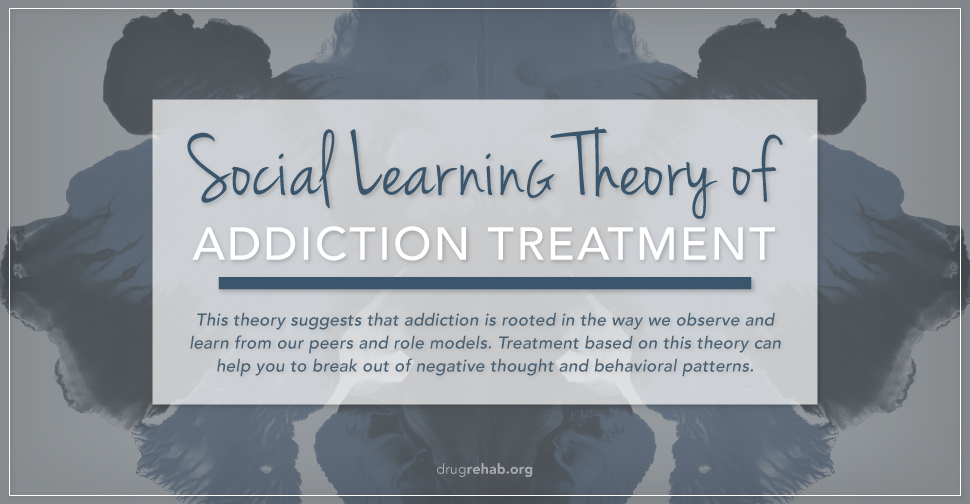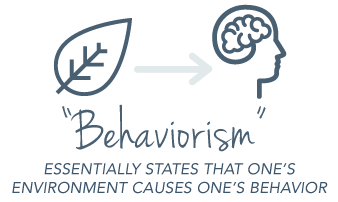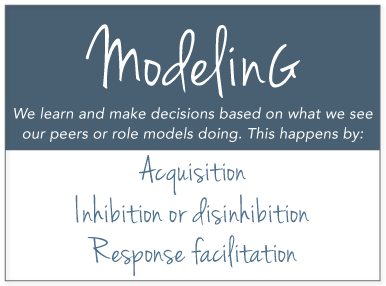
Addiction is shaped by biological, psychological, and social factors. The social learning theory (SLT) suggests that addiction is rooted in the way we observe and learn from our peers and role models. Treatment based on this theory can help you to break out of negative thought and behavioral patterns.
 As young children, we look up to our parents, older peers, and other adults. While social learning is a primary concern with children, it doesn’t stop when we grow up. As we get older, our social influences include other family members, friends, and coworkers.
As young children, we look up to our parents, older peers, and other adults. While social learning is a primary concern with children, it doesn’t stop when we grow up. As we get older, our social influences include other family members, friends, and coworkers.
Sadly, we don’t just learn from the positive influences of people whom we admire-—negative influences throughout our lives have the capacity to shape us too. Our observations and expectations of other’s experiences with drugs and alcohol can influence the way we view and use these substances.
Is Addiction Caused By One Factor?
Unfortunately, the old cliche “do as I say, not as I do” doesn’t always hold water, especially when it comes to substance abuse. Our nature is to learn by example. Even if our parents tell us not to drink alcohol or use drugs, we’ll still form opinions and emotional reactions when we see them do these things. These reactions may influence how we relate to drugs or alcohol down the road. For addiction specialists, this phenomenon conjures up one of the oldest debates in psychology—nature versus nurture.
While social factors surely influence drug abuse, some of the most renowned experts in the field caution that addiction is far more complicated. Though science has shown us that addiction is a disease of the brain, it’s also illustrated that addiction is caused by our biology, development, and environment. The social learning theory explains how social observations alter our attitudes and behaviors in a way which could make us more vulnerable to addiction.
What Is The Social Learning Theory?
Social learning theory asserts that we can learn by watching another person, not just from our own experiences. Our behaviors, thought processes, and even our emotional reactions develop from these observations. While this type of learning can be empowering and even protect us, we are not immune to the bad influences within our lives. According to UMASS Lowell, SLT impacts us in the following ways:
 Self-Regulation: Our attitudes, beliefs, expectations, and perceptions of these circumstances shape how we relate our environment to our behaviors. Our understanding of this relationship alters how we self-regulate our future behaviors.
Self-Regulation: Our attitudes, beliefs, expectations, and perceptions of these circumstances shape how we relate our environment to our behaviors. Our understanding of this relationship alters how we self-regulate our future behaviors.
Modeling: We learn and make decisions based on what we see our peers or role models doing. This happens by:
- Acquisition: People are far more likely to use substances if they see someone else doing so.
- Inhibition or dis-inhibition: Your ability to abstain from using is either built up or weakened by how you see other people resisting or giving in to drugs.
- Response facilitation: The risk of using goes up when you see people around you abusing drugs or alcohol.
Expectations: If you expect positive outcomes or rewards to accompany drinking or using drugs you’re more likely to engage in these risky behaviors.
Self-Efficacy: How you view yourself and your capability to handle certain situations impacts your capacity to change or set healthy goals.
Here’s an example: Growing up your mom was really anxious and depressed. When she drank she suddenly seemed more fun, relaxed, and happy. Now, as an adult, you’ve begun to confront these issues yourself. After watching your mom drink for so many years you equate alcohol to a positive outcome (boosting mood and reducing stress). This eventually leads you to start drinking when you want to feel better.
How Is The Social Learning Theory Used Within Addiction Treatment
Fortunately, treatment can counteract these harmful perspectives within our lives. Even though we learn a lot of these mindsets in childhood, it’s also important to stay away from negative influences as adults. If a person is exposed to positive influences and experiences within treatment, they can begin to model their own behaviors in these ways.
An article from the journal Drug and Alcohol Dependence outlines several behavioral therapies which are useful within SLT addiction treatment. Each of these helps a person to build better self-efficacy.
Behavioral Family Counseling (BFC): These sessions help families to resolve conflicts, build solidarity, lend support, and reward each other for abstinence.
Cognitive Behavioral Therapy (CBT): “Individual and group CBTs focus primarily on reducing patients’ positive expectances about substance use, enhancing their overall self-confidence and self-efficacy to resist substance misuse, and improving their skills in coping with daily life stressors, including relapse-inducing situations.”
Contingency Management (CM) and Community Reinforcement Approaches (CRA): These methods encourage abstinence with reward-based incentives and expose a person to positive role models.
Motivational Interviewing (MI)/Motivational Enhancement Therapy (MET): Helps to increase a person’s motivation for and dedication to change.
Twelve-Step Facilitation Therapy: Provides abstinent role models and teaches enhanced coping and stress-management skills.
These modalities will also help you to create healthier ways to self-regulate your emotions and thoughts. As addiction is a disease, certain medications may be necessary within addiction treatment.
A good treatment program will help you to develop better interpersonal skills. You can use these to create and maintain a healthy and positive support network after treatment. Aftercare programs will also help you to keep hold of these positive social influences.
How Is The Social-Educational Model Different From The Social Learning Theory?
The social-educational theory suggests that how we’re taught to think about substance abuse creates risk or protective factors for addiction. Our social connections help us to learn about the dangers and repercussions of substance abuse. Various groups or people can shape how we think about substance abuse by motivating, punishing, or correcting our behaviors.
This influence may take the form of laws, advice, or as certain social responsibilities. Without enough of this oversight or information, a person may begin or continue to abuse drugs or alcohol. The social-educational model of addiction treatment draws from this learning process.
Sometimes we forget or ignore this information. On the other hand, maybe you’ve never had the opportunity to be educated in these ways. In either case, this leaves us more vulnerable to the risks. During treatment, therapy and classes will help you to learn or re-learn these valuable protective factors. When a person understands how drugs can destroy their life, the theory goes that they will be more motivated to change by making informed and positive choices. Also, when a person begins to understand how their substance abuse affects others, they may be more apt to seek sobriety.
Don’t Let Negative Influences Overcome Your Life
If you’re facing addiction it’s important to understand that it’s not a moral failing or character flaw. Addiction is complicated. While it can be hard to unlearn certain damaging behaviors or thought processes, we want you to know it is possible. With our help, you can find a program that’s the perfect fit for your unique needs.
DrugRehab.org can connect you to life-changing resources and compassionate care. Find sobriety, contact us now.
For More Information Related to “Social Learning Theory Of Addiction Treatment” Be Sure To Check Out These Additional Resources From DrugRehab.org:
- The Risk Factors For Substance Abuse – What You Need To Know
- The Benefits Of Cognitive Behavioral Therapy (CBT) In Addiction
- How Do I Get My Loved One Into Rehab?
- Understanding A Heroin Use Disorder
- Is Addiction Genetic Or Environmental?
- Environmental Risk Factors for Developing an Addiction


